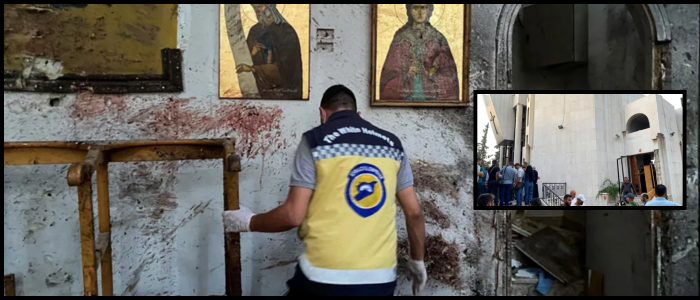The Attack and the Reaction
Syria's interior ministry said the attacker belonged to the Islamic State (IS) group, but IS has not said it was behind the attack. Witnesses reported scenes of chaos, with one saying that people tried to stop the triggerman before he detonated himself. Another witness from a shop opposite reported hearing shots followed by a huge explosion that shattered church furniture and blew debris then into the air.
Images and video from the church display a shattered altar, as well as broken glass-covered pews and blood on the walls. The church was reported to have been killed both inside and outside of the church.
The Greek Orthodox Patriarchate of Antioch condemned the attack as a "treacherous act," and called upon Syria's interim authorities to ensure the protection of all citizens and places of worship. Interior minister Anas Khattab described the bombing as an "abominable crime" and said the bombing is being investigated.
Wider Perspective and IS Activities
It is the first major assault in Damascus since Islamist-led forces ousted President Bashar al-Assad in December, ending more than a decade of civil war. IS suffered military defeat in 2019, but is still present, with the UN guessing there are between 1,500 and 3,000 fighters in Syria and Iraq. The group still attacks religious minorities, such as Christians and Shia Muslims.
International condemnation came quickly. US envoy Tom Barrack said these acts are not befitting a peaceful Syria that welcomes everyone, along with UN envoy Geir Pedersen, who urged the world to stand united against terrorism. Ahmed al-Sharaa, the interim president and head of the controversial HTS, renewed pledges to safeguard minorities, following recent sectarian violence.
It is a reminder of the threat still posed by extremist groups in Syria, even amid a relative political lull and as the Syrian government tries to secure the country and rebuild civil peace.
World

Suicide Bombing at Damascus Church Kills 22

A suicide bomber struck a church in the Syrian capital, Damascus, on Sunday evening, killing at least 22 people and wounding 63 others, Syria's health ministry reported. The assailant struck at the Greek Orthodox Church of the Prophet Elias in the neighbourhood of Dweila during an evening service before shooting at worshipers and then detonating an explosive vest.















